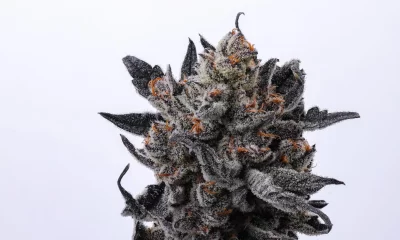Business
Oklahoma Medical Cannabis Firms File Suit To Block Fee Increases

A group of Oklahoma cannabis advocates has challenged new higher fees assessed on the state’s medical marijuana providers.
An Oklahoma cannabis activist has joined forces with three of the state’s medical marijuana providers to file a lawsuit against increased regulatory fees that went into effect last month. The legal action, which maintains that the fee increases are unconstitutional, was filed on Friday by Jeb Green, founder of Oklahomans for Responsible Cannabis Action, and the medical marijuana dispensaries Pharside, Oklahoma Natural Cures, and Bingo 101.
The lawsuit challenges a new fee structure for medical marijuana businesses signed into law by Oklahoma Republican Governor Kevin Stitt in May 2022. The measure, House Bill 2179 (HB 2179) raises the regulatory fees charged by the Oklahoma Medical Marijuana Authority (OMMA) for licensed medicinal cannabis businesses to operate in the state.
Previously, medical marijuana operators paid a flat fee of $2,500 for each licensed business. But under HB 2179, which went into effect on June 1 of this year, fees were hiked dramatically, with the largest cannabis cultivation operations now slated to pay up to $50,000 per year.
The lawsuit filed last week maintains that the fee increases authorized by the legislation constitute a “revenue-raising” measure, which under Oklahoma state law must be passed with at least a 75% majority of the members in both the Oklahoma Senate and the state House of Representatives. Additionally, revenue-raising bills may not be passed in the final five days of the legislative session.
But HB 2179 did not achieve the required supermajority and was passed in the closing days of the 2022 legislative session and was passed in the final days of the 2022 legislative session. The plaintiffs maintain that HB 2179 is not a simple regulatory bill because it does not add any new regulations intended to be funded by the new fees.
“In other words, the thrust of the legislation is not regulatory in nature but is designed to raise revenue instead,” the lawsuit states, as quoted by The Oklahoman. “Even if licensing fees provide some financial support to the OMMA, those fees are not closely tied to the cost of service for which they are imposed.”
The plaintiffs estimate that the new fees authorized by the legislation will increase licensing revenue collected by OMMA by at least $28,580,000 each year. The actual amount could be higher, they note, because some medical marijuana companies would be placed in different fee tiers based on the size of the operation.
The lawsuit claims that the increased fees are a violation of the Oklahoma Constitution and should be overturned. Additionally, the plaintiffs allege that HB 2179 created a discriminatory “special law” because it contains a tiered fee structure for some businesses but not others.
“Our challenge to (the law) is about more than cannabis. This is a constitutional question that affects every Oklahoma taxpayer. We are respectfully requesting that the court consider our plea,” said Green. “Our medical marijuana program has been revenue-positive since Day One. It has contributed hundreds of millions of dollars in revenue the last five years. The license fee increases on our industry are not needed to support regulation.”
HB 2179 is not the only legislation passed to tighten the regulations for Oklahoma’s medical marijuana program. After a ballot initiative to legalize recreational marijuana in Oklahoma failed to gain voters’ approval in March, lawmakers introduced dozens of bills proposing stricter regulations on the state’s medical marijuana providers. Nine of the measure were approved by lawmakers and signed into law by Stitt. Among them is SB 18X, which creates a Medical Marijuana Tax Fund under the control of the state legislature that will accrue medical marijuana tax revenue collected by the state for appropriation to OMMA.
Source: https://hightimes.com/news/oklahoma-medical-cannabis-firms-file-suit-to-block-fee-increases/
Business
New Mexico cannabis operator fined, loses license for alleged BioTrack fraud

New Mexico regulators fined a cannabis operator nearly $300,000 and revoked its license after the company allegedly created fake reports in the state’s traceability software.
The New Mexico Cannabis Control Division (CCD) accused marijuana manufacturer and retailer Golden Roots of 11 violations, according to Albuquerque Business First.
Golden Roots operates the The Cannabis Revolution Dispensary.
The majority of the violations are related to the Albuquerque company’s improper use of BioTrack, which has been New Mexico’s track-and-trace vendor since 2015.
The CCD alleges Golden Roots reported marijuana production only two months after it had received its vertically integrated license, according to Albuquerque Business First.
Because cannabis takes longer than two months to be cultivated, the CCD was suspicious of the report.
After inspecting the company’s premises, the CCD alleged Golden Roots reported cultivation, transportation and sales in BioTrack but wasn’t able to provide officers who inspected the site evidence that the operator was cultivating cannabis.
In April, the CCD revoked Golden Roots’ license and issued a $10,000 fine, according to the news outlet.
The company requested a hearing, which the regulator scheduled for Sept. 1.
At the hearing, the CCD testified that the company’s dried-cannabis weights in BioTrack were suspicious because they didn’t seem to accurately reflect how much weight marijuana loses as it dries.
Company employees also poorly accounted for why they were making adjustments in the system of up to 24 pounds of cannabis, making comments such as “bad” or “mistake” in the software, Albuquerque Business First reported.
Golden Roots was fined $298,972.05 – the amount regulators allege the company made selling products that weren’t properly accounted for in BioTrack.
The CCD has been cracking down on cannabis operators accused of selling products procured from out-of-state or not grown legally:
- Regulators alleged in August that Albuquerque dispensary Sawmill Sweet Leaf sold out-of-state products and didn’t have a license for extraction.
- Paradise Exotics Distro lost its license in July after regulators alleged the company sold products made in California.
Golden Roots was the first alleged rulebreaker in New Mexico to be asked to pay a large fine.
Source: https://mjbizdaily.com/new-mexico-cannabis-operator-fined-loses-license-for-alleged-biotrack-fraud/
Business
Marijuana companies suing US attorney general in federal prohibition challenge

Four marijuana companies, including a multistate operator, have filed a lawsuit against U.S. Attorney General Merrick Garland in which they allege the federal MJ prohibition under the Controlled Substances Act is no longer constitutional.
According to the complaint, filed Thursday in U.S. District Court in Massachusetts, retailer Canna Provisions, Treevit delivery service CEO Gyasi Sellers, cultivator Wiseacre Farm and MSO Verano Holdings Corp. are all harmed by “the federal government’s unconstitutional ban on cultivating, manufacturing, distributing, or possessing intrastate marijuana.”
Verano is headquartered in Chicago but has operations in Massachusetts; the other three operators are based in Massachusetts.
The lawsuit seeks a ruling that the “Controlled Substances Act is unconstitutional as applied to the intrastate cultivation, manufacture, possession, and distribution of marijuana pursuant to state law.”
The companies want the case to go before the U.S. Supreme Court.
They hired prominent law firm Boies Schiller Flexner to represent them.
The New York-based firm’s principal is David Boies, whose former clients include Microsoft, former presidential candidate Al Gore and Elizabeth Holmes’ disgraced startup Theranos.
Similar challenges to the federal Controlled Substances Act (CSA) have failed.
One such challenge led to a landmark Supreme Court decision in 2005.
In Gonzalez vs. Raich, the highest court in the United States ruled in a 6-3 decision that the commerce clause of the U.S. Constitution gave Congress the power to outlaw marijuana federally, even though state laws allow the cultivation and sale of cannabis.
In the 18 years since that ruling, 23 states and the District of Columbia have legalized adult-use marijuana and the federal government has allowed a multibillion-dollar cannabis industry to thrive.
Since both Congress and the U.S. Department of Justice, currently headed by Garland, have declined to intervene in state-licensed marijuana markets, the key facts that led to the Supreme Court’s 2005 ruling “no longer apply,” Boies said in a statement Thursday.
“The Supreme Court has since made clear that the federal government lacks the authority to regulate purely intrastate commerce,” Boies said.
“Moreover, the facts on which those precedents are based are no longer true.”
Verano President Darren Weiss said in a statement the company is “prepared to bring this case all the way to the Supreme Court in order to align federal law with how Congress has acted for years.”
While the Biden administration’s push to reschedule marijuana would help solve marijuana operators’ federal tax woes, neither rescheduling nor modest Congressional reforms such as the SAFER Banking Act “solve the fundamental issue,” Weiss added.
“The application of the CSA to lawful state-run cannabis business is an unconstitutional overreach on state sovereignty that has led to decades of harm, failed businesses, lost jobs, and unsafe working conditions.”
Business
Alabama to make another attempt Dec. 1 to award medical cannabis licenses

Alabama regulators are targeting Dec. 1 to award the first batch of medical cannabis business licenses after the agency’s first two attempts were scrapped because of scoring errors and litigation.
The first licenses will be awarded to individual cultivators, delivery providers, processors, dispensaries and state testing labs, according to the Alabama Medical Cannabis Commission (AMCC).
Then, on Dec. 12, the AMCC will award licenses for vertically integrated operations, a designation set primarily for multistate operators.
Licenses are expected to be handed out 28 days after they have been awarded, so MMJ production could begin in early January, according to the Alabama Daily News.
That means MMJ products could be available for patients around early March, an AMCC spokesperson told the media outlet.
Regulators initially awarded 21 business licenses in June, only to void them after applicants alleged inconsistencies with how the applications were scored.
Then, in August, the state awarded 24 different licenses – 19 went to June recipients – only to reverse themselves again and scratch those licenses after spurned applicants filed lawsuits.
A state judge dismissed a lawsuit filed by Chicago-based MSO Verano Holdings Corp., but another lawsuit is pending.
Source: https://mjbizdaily.com/alabama-plans-to-award-medical-cannabis-licenses-dec-1/
-

 Business2 years ago
Business2 years agoPot Odor Does Not Justify Probable Cause for Vehicle Searches, Minnesota Court Affirms
-

 Business2 years ago
Business2 years agoNew Mexico cannabis operator fined, loses license for alleged BioTrack fraud
-

 Business2 years ago
Business2 years agoAlabama to make another attempt Dec. 1 to award medical cannabis licenses
-

 Business2 years ago
Business2 years agoWashington State Pays Out $9.4 Million in Refunds Relating to Drug Convictions
-

 Business2 years ago
Business2 years agoMarijuana companies suing US attorney general in federal prohibition challenge
-

 Business2 years ago
Business2 years agoLegal Marijuana Handed A Nothing Burger From NY State
-

 Business2 years ago
Business2 years agoCan Cannabis Help Seasonal Depression
-

 Blogs2 years ago
Blogs2 years agoCannabis Art Is Flourishing On Etsy













